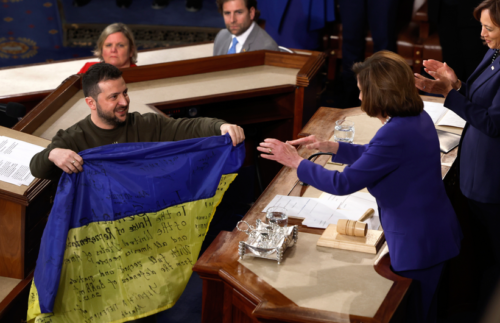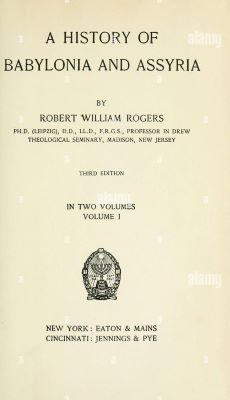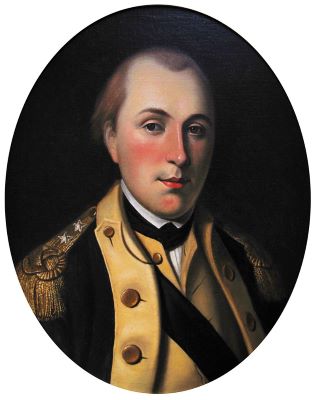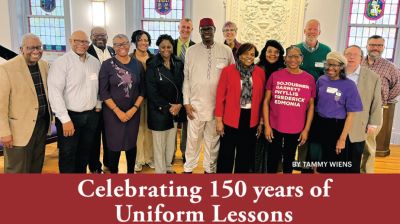
Voldymor Zelenskyy and Vladimir Putin, two historical figures in the present, have given the United States history lessons about our own past. In one case the action was deliberate: Zelenskyy’s deliberate reference to the Battle of Saratoga. In the other case. It was through his actions and not a speech. Together they present the American history community as well as the American people with lessons to be learned and/or ignored.
PUTIN
Putin has been raining a barrage of missiles on the Ukrainian nation. A lot of the media focus here has been on the infrastructure which has been destroyed. Putin’s goal seems to be, if I may draw on an historical reference from General Curtis LeMay from the Vietnam War, is to bomb Ukraine back into the stone age. He seeks to decimate the ability of the country to provide electric power and water to its people. By now we have all seen eerie shots of people walking darkened streets save for a flashlight or a candle.
What struck me about the historical significance of what Putin was and is doing is an article in The New York Times from December 29 (print) with the title “A Culture Under Fire: Russia’s invasion has systematically destroyed Ukrainian cultural sites, a Times investigation found” (with a followup article “Cultural Heritage as a Battlefront: Tallying the damage to museums and Cathedrals during the war in Ukraine,” December 31 print) We know about recent efforts by both ISIS and the Taliban to destroy the non-Islamic objects unacceptable to them. We also know about the genocidal actions by Russia in Ukraine. But this article forced me to come face to face with the cultural assault on the country as well.
Pay attention to what Putin is choosing to destroy as reported in the article.
It [the barrage] has also dealt a grievance blow to Ukrainian culture: to its museums and monuments, its grand universities and rural libraries, its historic churches and contemporary mosaics.
Now think about the American counterparts to the items listed above. Imagine their destruction even with no people being destroyed. How would we react?
The article continues:
Libraries, architectural treasures, statues, churches, houses of culture, museums, cinemas, sports facilities, theaters and archaeological sites have been damaged or destroyed.
Put aside the pontifications of academics and eggheads and recognize the truth of what Putin is doing. He has targeted the Ukrainian culture and heritage for destruction. If something has not been bombed, then it has been looted. The 5-page article identifies many of the locations by name and includes many pictures. The Ukrainian memory of its own heritage is being dismantled. One day the infrastructure will be rebuilt. The people will once again have electricity and running water. But the same cannot be said for books, artifacts, paintings, and statues which have been destroyed. It will be like rebuilding after an earthquake where everything before 2022 has been destroyed.
Nothing comparable is happening here. I do not mean to compare Putin’s actions to the toppling of statues and renaming of streets. Instead I am referring to something more insidious – the budgets for culture and the arts; the teaching of history and the humanities in public schools; the visiting to the local history sites in your own community. These items tend to be first on the chopping block for “saving” money by reducing the budget. They are peripherals not essential to the well-being of a community or the development of a child. Putin knows better. He knows how important all the things listed above are for the health and well-being of a community. His scorched earth actions to obliterate the cultural heritage of Ukraine is not an accident, it is not collateral damage. It is a targeting of a people.
In looking at what Putin has targeted, we should think about what we need to preserve, what we need to teach, what we need to visit to sustain a healthy community … and to educate newcomers to our country, our states, and our municipalities about what it means to be an American. We need to keep expanding our history markers, and museums to include the history which has happened and the new history which is being created even as these words are being typed. Putin has told us what is important through his efforts to destroy it in Ukraine. Let it be a lesson to us.
ZELENSKYY
By contrast, Zelenskyy has reminded us very specifically what should be important to us. Standing in the chambers of Congress, Zelenskyy said the Ukrainian fight today was like the Battle of Saratoga to us. Those words reminded me of the Gettysburg Address when Lincoln linked the war in his present to an action four-score and seven years earlier. He could take for granted that his audience knew he meant the Declaration of Independence.
We know what the Battle of Saratoga means to Zelenskyy. What does it mean to Americans?
It was somewhat amusing in the talk show discussions after Zelenskyy’s speech, to listen to people draw of their knowledge of what the Battle of Saratoga meant to the founding of the country. When did they last come in contact with that battle? A book they read? A site they visited? A class they took in college? A class they took in high school? A class they took even earlier?
A quick review of the more than 200+ sessions at the annual conference of the American Historical Association going on January 5-8, 2023, in Philadelphia showed none related to the American Revolution yet alone to the Battle of Saratoga. True there are other conferences more focused in time which may include sessions on the American Revolution and possibly even on the Battle of Saratoga.
Now considered these two lectures:
“How Indigenous People Helped Start and Win the American Revolution” by Woody Holton (December 16, 2022) at the Native Americans Study Center
and
“The Compleat Victory: Saratoga and the American Revolution,” Colonel (Ret.) Kevin Weddle, Ph.D. at Marist College (April 13, 2022), a college with close ties to nearby West Point.
The second lecture comports with what Zelenskyy meant; the first one subsumes Saratoga into a larger talk about the role of Indigenous people with the battle being secondary.
Drilling down, if one were to take a course in American history in college, what if anything would be taught about the Battle of Saratoga?
If one takes a(n elective?) course in American history in high school, what if anything would be taught about the Battle of Saratoga?
If one takes a class in American history in middle school (as one typically does here in New York), what if anything would be taught about the Battle of Saratoga?
One cannot help but wonder if all the members of Congress are even familiar with the Battle of Saratoga. They recognize from Zelenskyy’s speech that it must have been an important battle but beyond that what do they know about it?
As we approach the 250th anniversary of the Battle of Saratoga, what should we do?
The American Revolution 250th Commission created at the federal level will be out of existence by the summer of 2027 when the 250th anniversary of the Battle of Saratoga occurs. The Commission’s focus is July 4 in Philadelphia. Someone needs to inform the Commission (again) of this shortcoming especially now that Zelenskyy has made a point of emphasizing its importance. The end date should be extended.
New York State, where the Commission does extend beyond 2027, should invite Zelenskyy to attend whatever festivities and events will be held in conjunction with the 250th anniversary.
At least one of the national history organizations (SHEAR?) should considered holding its annual summer conference in Saratoga in 2027 perhaps in partnership with Skidmore College.
There should be a review of the social studies curriculum and teacher professional development programs to ensure that American students are as familiar with the Battle of Saratoga as the President of Ukraine.
Putin has shown us in his destructions what we should maintain here in the United States as part of our cultural and historic heritage.
Zelenskyy has shown what we as Americans should all know about our past. The United States of America will be much better off if Americans are at least as familiar with the Battle of Saratoga at the birth of the country as it is with Gettysburg when it divided.





